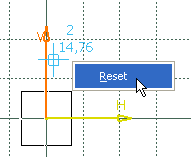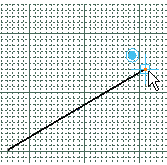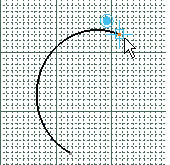SmartPicking | |||||
|
| ||||
Coordinates
When you move the cursor, H and V corresponding coordinates appear on the screen and also in the Sketch tools toolbar.
The coordinate at the top is H and the coordinate
at the bottom is V.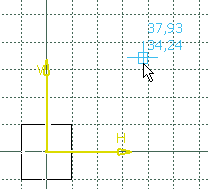
![]()
SmartPicking Somewhere on the Grid
SmartPick displays the SmartPick blue cursor that can
be snapped to the grid according the Snap to Point option
![]() from the Sketch tools toolbar.
from the Sketch tools toolbar.
This option is also available in the Sketcher settings (see Snap to point in the Customizing section of this guide).
The SmartPick blue cursor is at the grid intersection point and far from the cursor, the Snap to Point option is activated:
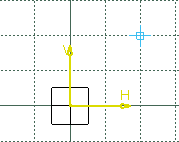
The SmartPick blue cursor is close to the cursor, the
Snap to Point option is deactivated: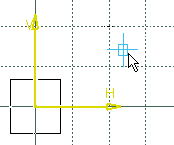
![]()
SmartPicking Using Coordinates
As you move the cursor and try to assign the desired position to the SmartPick cursor, the Sketch tools toolbar similarly displays the corresponding horizontal and vertical coordinates of the SmartPick blue cursor.
You can use the Sketch tools toolbar fields for defining the point coordinates either independently from each others or not.
For example, enter H: 2mm. SmartPick is locked on this value. As you move the cursor the V coordinate appears in the Sketch tools toolbar.
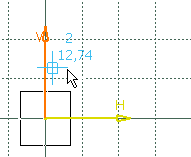
If you want to reset H or V coordinates you just entered in the Sketch tools toolbar, display the contextual menu (right-click on the background) and select the Reset command.
|
|
![]()
SmartPicking Hiding Coordinates
Unselect Visualization of the cursor coordinates in the Sketcher settings, the cursor coordinates are automatically hidden as you move the cursor within the geometry area.
Unselect Visualization of the cursor coordinates in the Sketcher settings (see Visualization of the cursor coordinates in the Customizing section of this guide).
The cursor coordinates are automatically hidden as you move the cursor within the geometry area.

![]()
SmartPicking on H and V Axes
As you move the cursor and try to assign the desired position to the SmartPick cursor, a horizontal fictitious blue dotted line appears when V is equal to zero, a vertical fictitious blue dotted line appears when H is equal to zero.
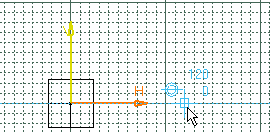
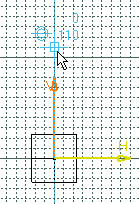
![]()
SmartPicking on a Point
When a point is included in the tolerance zone of the SmartPick cursor, SmartPick first snaps to the point and the point-to-point coincidence symbol appears.
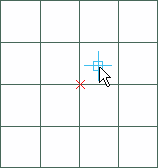
This symbol means that snapping suppresses both degrees of freedom available for a point.
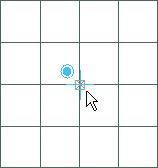
![]()
SmartPicking at a Curve Extremity Point
When a fictitious curve extremity point is included in the tolerance zone of the SmartPick cursor, SmartPick snaps to the extremity of this curve.
The point-to-point coincidence symbol appears once the point is picked.
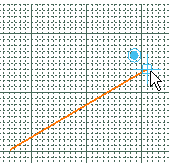
| Warning:
By
default, all the curves are assigned fictitious extremity points.
This is why, and as you will probably expect, SmartPick detects
first point-to-point coincidence with the curve existing end point.
Care that in this case only the extremity point is highlighted whereas
in the previous case the whole line is highlighted.
|
You can also use the contextual menu (Nearest End Point option) while going over any curve type element with the cursor, and detect first point-to-point coincidence with the curve existing end point.
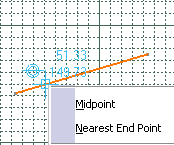
![]()
SmartPicking at the Midpoint of a Line
When the midpoint of a line is included in the tolerance zone of the SmartPick cursor, SmartPick snaps to the midpoint of this line.
The point-to-point coincidence symbol appears once the midpoint is picked and the line is highlighted.
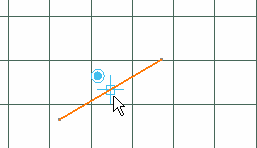
To do this, you can also use Midpoint from the contextual menu.
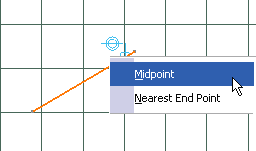
![]()
SmartPicking at the Center of a Circle
When the fictitious center of a circle is included in the tolerance zone of the SmartPick cursor, SmartPick snaps at the center of this circle.
The point-to-point coincidence symbol appears once the circle center is picked and the circle is highlighted. To do this, you can also use Concentric from the contextual menu on the circle.
| Warning: By default, circles are created with a center point. As a result, SmartPick detects first point-to-point coincidence. |
![]()
SmartPicking All Over a Curve
When a curve is included in the tolerance zone of the SmartPick cursor, SmartPick automatically snaps to the curve which is then highlighted.
The curve coincidence symbol appears as you go all over the curve with the cursor. This symbol means the point is snapped and that there is still one degree of freedom left, except when two curves are detected at the same time.
This is also true in the case of curves that can be extrapolated, (segments, arcs of circles, re-limited splines or conic curves). SmartPick will snap to these curves on the condition that they are included in the tolerance zone of the SmartPick cursor.
For this, select Support lines and circles (see SmartPick options in the Customizing section of this guide).
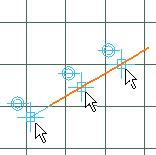
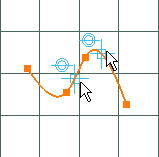
Detecting a coincidence using the Ctrl key
-
Go over the element to be made coincident. For example, a line.
-
Press and hold down the Ctrl key. The SmartPick cursor remains positioned on the picked element.
-
Move the cursor wherever you want.
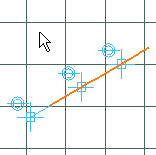
For more details on the Ctrl key, see About Geometry Using SmartPick.
![]()
SmartPicking at the Intersection Point of Two Curves
When the intersection point of two curves is included in the tolerance zone of the SmartPick cursor, both curve-type elements are highlighted.
The coincidence symbol appears and the SmartPick cursor snaps to the intersection.
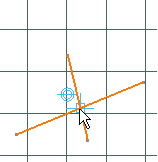
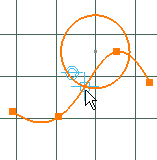
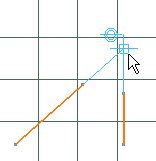
This type of detection illustrates SmartPick main functionality: combined detection. In fact, when two snappings can possibly be performed, SmartPick aims at satisfying both of them by trying to snap them at the same time. This smart behavior is a global behavior and is valid for any kind of detection recognized by SmartPick.
Detecting an intersection using the Ctrl key
-
Go over the element to be made coincident. For example, a line. The coincidence symbol appears to indicate that SmartPick snaps over the line.
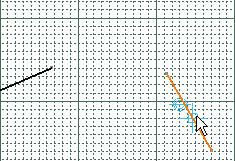
-
Press the Ctrl key. SmartPick automatically remains snapped whatever the position you assign to the cursor.
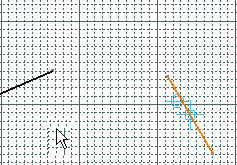
-
As you press the Ctrl key, go over the second element to be intersected with the element already picked using the cursor. When SmartPick detects that the second line can possibly be snapped to, SmartPick tries to combine both snappings detected thanks to the Ctrl key. In this particular case, SmartPick snaps at the intersection of both lines.
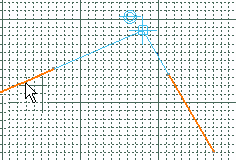
![]()
On Fictitious Perpendicular Line Through Line End Point
If the tolerance zone of the SmartPick cursor goes over a fictitious perpendicular line that goes through the extremity point of a line, SmartPick snaps in order to remain on this fictitious perpendicular line.
Make sure you selected the Alignment option (see SmartPick options in the Customizing section of this guide). You will thus automatically detect the different elements along which the sketch is aligned.
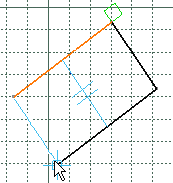
![]()
SmartPicking at a Vertical/Horizontal Position
If the tolerance zone of the SmartPick cursor crosses a fictitious horizontal line that would go through a point, SmartPick snaps in order to remain horizontal to this point.
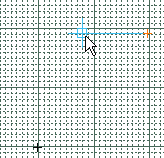
In this case, no constraint is created.
Make sure you selected the Alignment option (see SmartPick options in the Customizing section of this guide). You will thus automatically detect the different elements along which the sketch is aligned.
